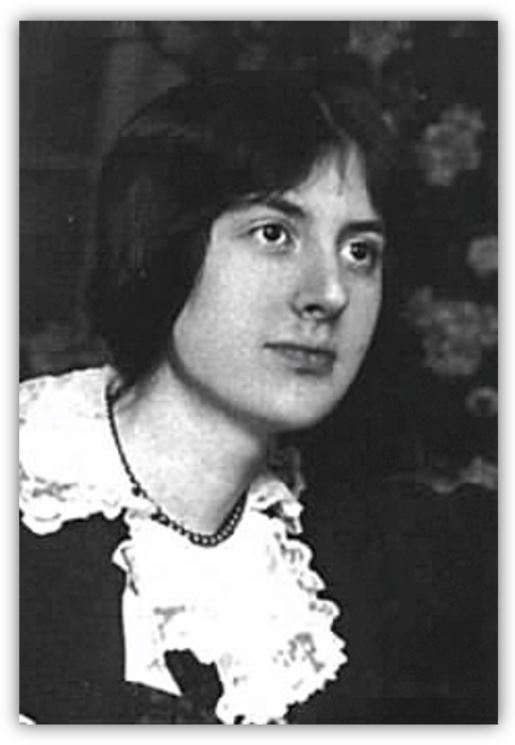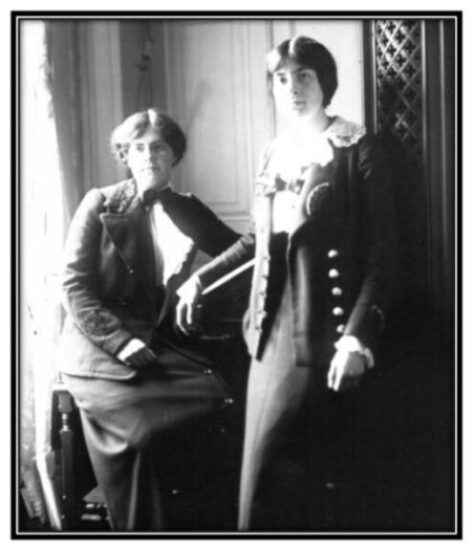Photo from Wikimedia
CHARATERS
NADIA BOULANGER (16 September 1887 to 22 October 1979), French composer and conductor. Likely the greatest music teacher of all time. Possibly the most influential teacher since Socrates, as one leading composer has said of her. In that capacity Boulanger has influenced generations of music, most notably in the United States and other English-speaking countries. It can well be asserted that American classical music would not be what it is today, but for Nadia Boulanger. Say the same thing for tango. And for Quincy Jones’s music.
Lists of Nadia Boulanger’s students, in addition to Quincy Jones, include Aaron Copland, Philip Glass, Daniel Barenboim, Igor Markevitch, Michel Legrand, Gian Carlo Menotti, Ástor Piazzolla, Roy Harris, Virgil Thomson, John Eliot Gardiner, Walter Piston, Darius Milhaud, Elliott Carter, Dinu Lipatti, İdil Biret, Louise Talma, David Conte, Errol Morris, Joe Raposo and Lalo Schifrin (among legions of others). But notably not George Gershwin, whom she politely informed, “I can teach you nothing” (which Gershwin proudly repeated as a taken compliment for the rest of his life).
As an analyst of composition she was nothing short of brilliant. Her memory was prodigious. Students describe her as knowing every significant piece of music ever written. Aaron Copland said of her, “Nadia Boulanger knew everything there was to know about music; she knew the oldest and the latest music, pre-Bach and post-Stravinsky. All technical know-how was at her fingertips: harmonic transposition, the figured bass, score reading, organ registration, instrumental techniques, structural analyses, the school fugue and the free fugue, the Greek modes and Gregorian chant.”
As a person she tended toward perfectionism and impatience. Composer Philip Glass, who studied with her for two years, wrote that she tried to be kind but “stayed pretty much in the range between intimidating and terrifying”.
LILI BOULANGER (21 August 1893 to 15 March 1918). Nadia’s sister, played throughout as 24.
ANNETTE DIEUDONNÉ (1896 – 1991). Nadia’s lifelong friend and companion, diminutive, snub-nosed, angelic, and anxiety-ridden.
LEONARD BERNSTEIN (1918 – 1990).
MICHEL LEGRAND (1932 – 2019).
IGOR MARKEVITCH (1912 – 1983).
ÁSTOR PIAZZOLLA (1921 – 1992).
SIMONE RATEL, interviewing NADIA (in Paris) for Minerva magazine.
A STUDENT. Female. 20’s.
SCENE 1 – ON HER 92nd BIRTHDAY
Fontainebleau, 16 September 1979. NADIA (92), motionless in bed, her eyes and face closed. Beautifully dressed and groomed. A crucifix gleams at her throat. At the stage-left side of the bed LILI is sitting in a bedside chair, silently. Lili’s form is visible only to the audience.
BERNSTEIN (61) and ANNETTE DIEUDONNÉ (83) enter, the latter emphatically placing a cautionary forefinger to her lips.
ANNETTE DIEUDONNÉ
[sharp whisper] Ten minutes. Only…. Only.
BERNSTEIN
[whisper] Yes, Mademoiselle Dieudonné, I understand.
ANNETTE DIEUDONNÉ stands off, to the side. BERNSTEIN initially kneels at the stage-right side of Nadia’s bed. Time passes, in silence. A deep-throated bell rings (offstage).
NADIA
Who’s there?
BERNSTEIN
[standing] Lenny. Leonard.
NADIA
Cher Lenny.
BERNSTEIN
My dear, dear friend….
How do you feel?
NADIA
Quite strong.
ANNETTE DIEUDONNÉ comes over, raises the back of Nadia’s bed (putting her in an upright position), and then returns, to stand off to the side.
BERNSTEIN
You mean?… inside yourself.
NADIA
Yes. Inside myself. But the flesh….
BERNSTEIN
I understand.
[hurriedly] I’ll go. You must be very tired.
NADIA
No tiredness. None….
[commanding] And don’t leave.
Help me think of our friends I have known. I’ve been thinking.
NADIA drifts back to sleep. BERNSTEIN takes a seat at the stage-right side of the bed. LILI continues sitting at Nadia’s left.
BERNSTEIN
I’ll try.
But how can I possibly remember everyone?
Just, even, the masters you’ve taught.
You’ve changed the face of music, my friend, in your life.
Aaron Copland.
Philip Glass.
Daniel Barenboim.
Quincy Jones.
Igor Markevitch.
Michel Legrand.
Gian Carlo Menotti.
Ástor Piazzolla.
Roy Harris.
Virgil Thomson.
John Eliot Gardiner.
Walter Piston.
Elliott Carter.
Pierre Henry.
Dinu Lipatti.
İdil Biret.
Jeremy Menuhin.
Roger Sessions.
David Diamond.
Jean Françaix.
Ginette Neveu.
Grażyna Bacewicz.
Robert Russell Bennett.
Louise Talma.
Elie Siegmeister.
David and Dorothy Dushkin.
Marion Bauer.
Gail Kubik.
Darius Milhaud.
Nora Baker.
Richard Stoker.
Marc Blitzstein.
Thea Musgrave.
Douglas Stuart Moore.
Sir Lennox Berkeley.
Elaine Bearer.
William Sloane Coffin.
David Conte.
Errol Morris.
Joe Raposo.
Donald Byrd.
Lalo Schifrin….
Oh! a thousand more. It’s impossible.
NADIA
[waking] What’s impossible?
BERNSTEIN
All the names on my mind.
NADIA
Names?… What music is on your mind?
What’s going through your mind now, Lenny?
What are you working on?
BERNSTEIN
Many things.
NADIA
Many things of what?
Offstage:
Sing God a simple song
Lauda, Laudē
Make it up as you go along
Lauda, Laudē
Sing like you like to sing
God loves all simple things
For God is the simplest of all.
A Simple Song from Bernstein Mass
BERNSTEIN
I don’t live a day without music in my mind.
Playing it. Studying it. Hearing it. Thinking it….
My Mass just crossed my mind…. And yet, now it’s Mahler’s Ninth.
NADIA
Berlin. I know
BERNSTEIN
And a Divertimento I’m composing for Boston Symphony’s centennial.
Sennets and Tuckets from Bernstein’s Divertimento for Orchestra
BERNSTEIN
Do you hear music in your mind? like that?
NADIA
All the time.
BERNSTEIN
What are you hearing at the moment? Mozart?
Monteverdi? Bach?
Stravinsky?
Ravel?
NADIA
One music. No beginning. No end.
BERNSTEIN
Where, Nadia? Where is it? Where is there no beginning and no end?
NADIA
Are you asking me where spirits of the dead fly?
Into music, of course. Into my thoughts, young man. Into the music of my soul.
BERNSTEIN
Do you see anything?
NADIA
Do you mean, am I blind yet?
BERNSTEIN
Mademoiselle Boulanger, you have one of the greatest minds I’ve ever known.
Maybe ever created. Tell me. Please.
What do you see in that place where there is no beginning and no end?
NADIA
I’ve seen it most of my life. And when I can’t, Lili brings it back to me.
With her left hand, takes Lili’s hand.
I hear her music. There’s never enough time to have enough time with Lili….
I’ve taught you a few things, Lenny, and a few things to many others.
But never, at such an age, was there a talent to excel Lili’s….
[beat] I feel sorry for those whose lives lack the sight of music.
Who struggle so hard to never find out what they always wanted to know.
BERNSTEIN
Is there anything you’ve always wanted to know?
NADIA
Promises.
What promises people keep. And what ones they don’t.
Pause.
What else matters more for the moment, than promises?
Not much else lasts. But music and mathematics, of course.
They are the only lasting things we’re permitted.
Music. Mathematics. And honor.
BERNSTEIN
Faith, maybe…. Maybe faith as well.
NADIA
Faith….
Faith to become what we’re meant to become.
Faith to fulfill our purpose in life.
And an ear to hear it.
And all else is vanity.
BERNSTEIN
A little harsh, my Love.
NADIA
You’ve always dreamed your music would have relevance, haven’t you?
BERNSTEIN
What I’ve dreamed of is a world that hears music. And feels it. Deeply.
Just listens to it. And can go on from there.
Where music is the reply to violence.
To make music more intensely, more brilliantly, more beautifully.
More fiercely than any enemy of man, woman or child.
To make music people’s hearts hear. Here. And take with them, everywhere.
To make music to heal the harm and quiet the anger.
To make music that better lifts and tells a life than any book or play.
NADIA
I’ve dreamed the same. The freedom of it. The protection of it.
Music leading the world from senseless war.
[beat] You’d think people would have recognized it by now.
That life’s not predicated on force and violence. It can’t be. That’s meaningless.
Life is predicated on living. On children. And new children. And love. And music.
Not on wars and soldiers. Battles and new battles.
Life is predicated on Bach.
What I dream of, Lenny, is that we’re all made of stars and chords.
Pause.
I dream music guides my soul. Toward heaven. Toward Lili.
In my quiet hours I can see her, and how music is the structure of life’s meaning. In music is the underlying truth of the universe.
I see that more every day. How life moves to music, and death moves to stillness.
The grand silence.
We’re all part of something greater, Lenny. Aren’t we?
I’ve always believed that. Because our minds get lost otherwise.
I’ve never stopped believing in music. Or God.
Just as I’ve never stopped loving my sister, Lili.
Whatever else I haven’t done, I’ve never stopped that.
Pause.
But, you’re right, Lenny, I can see something out there, at times.

Click here for complete script

